#omar al-bashir
Explore tagged Tumblr posts
Text
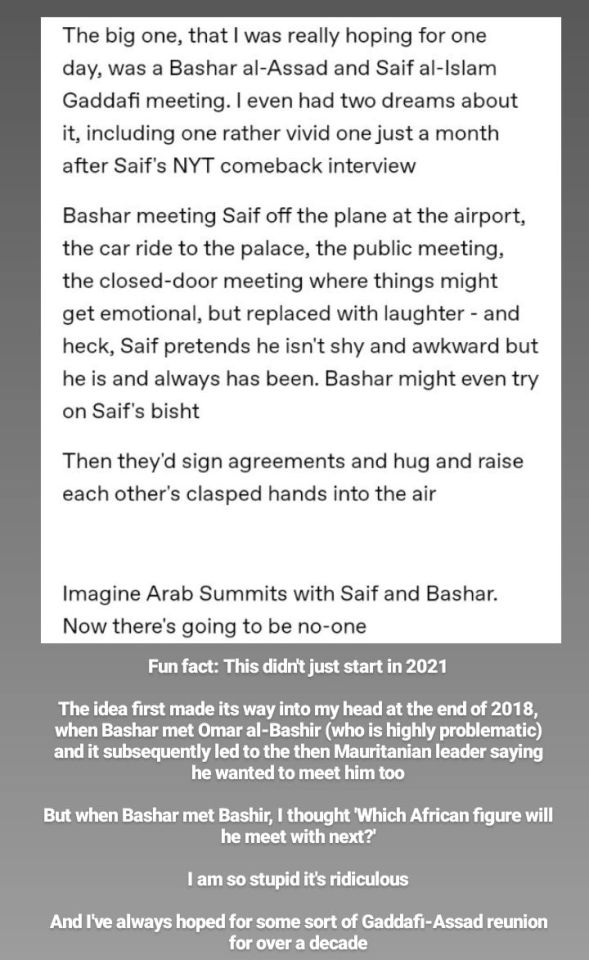
7 notes
·
View notes
Text
Sudan’s people toppled a dictator – despite the war they’re still working to bring about democratic change
Civilians protest in Sudan’s capital, Khartoum, in December 2022. AFP via Getty Images Linda Bishai, George Washington University While Sudan’s generals have unleashed indiscriminate destruction and occupation on wide swaths of the capital, Khartoum, neighbourhood resistance committees and pro-democracy activists have stepped up to respond to the needs of citizens. They have risked their lives…
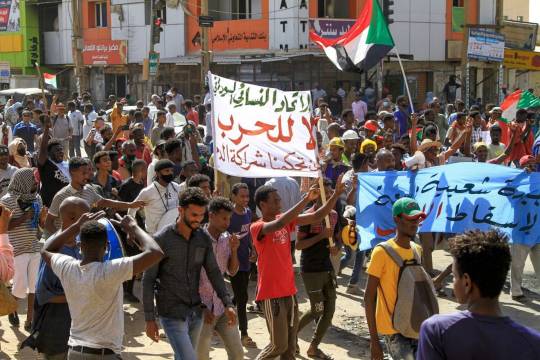
View On WordPress
#Abdalla Hamdok#Abdel Fattah al-Burhan#civil society organisations#Corepaedia#corepaedianews#Hemedti#Khartoum#Military rule#Omar al-Bashir#Rapid Support Forces (RSF)#Sudan#Sudan crisis#youth movements
1 note
·
View note
Text
Sudan’s struggle is obscured by political upheavals, displacements, and hunger after the fall of President Omar al-Bashir and the 2021 coup, but why has the world turned a blind eye to the ‘forgotten war’?
#sudan crisis#forgotten war#political upheaval#displacement#hunger#omar al bashir#sudan 2021 coup#international neglect#humanitarian crisis#global awareness#conflict zone#world responsibility#peacebuilding#crisis ignored#media focus#human rights#sudanese people#global indifference#awareness gap#urgent action
192 notes
·
View notes
Text
ICC Chief Prosecutor Targets Netanyahu and Hamas Leaders for Arrest Warrants
May 20, 2024 The International Criminal Court’s (ICC) chief prosecutor, Karim Khan, is seeking arrest warrants for several high-profile figures due to their actions during a seven-month war. The individuals include Israeli Prime Minister Benjamin Netanyahu, his defense minister Yoav Gallant, and three leaders from Hamas: Yehya Sinwar, Mohammed Deif, and Ismail Haniyeh. Summary: The ICC has…
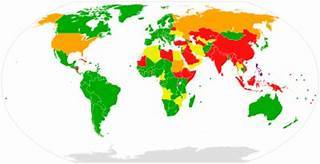
View On WordPress
#addressing disparities#ahmad al faqi al mahdi#AI News#Al Hassan#benjamin netanyahu#case analysis#core crimes#crime forecasting#crimes against humanity#ethical AI#evidence review#gaza#genocide#ICC#International Criminal Court#Ismail Haniyeh#israel#jean-pierre bemba#jurisdiction#karim khan#Mohammed Deif#News#omar al bashir#predictive analytics#resource management#rome statute#thomas lubanga#United Nations Security Council#war#war crimes
0 notes
Text
الانتقائية في العدالة الجنائية الدولية
الانتقائية في العدالة الجنائية الدولية الانتقائية في العدالة الجنائية الدولية الكاتب : أحمد بشارة موسى الملخص: الحقيقة أن المعايير الإنسانية لا يتم اتخاذها إلا في مواجهة الدول الصغيرة والضعيفة، في حين نجد أن هناك العديد من الانتهاكات الجسيمة ضد الإنسانية ترتكب في أماكن أخرى من العالم، لم تحرك الأمم المتحدة فيها ساكنا ولم تطالب فيها بإنشاء محاكم جنائية دولية لمن ارتكبوا هذه الانتهاكات. كما أن…
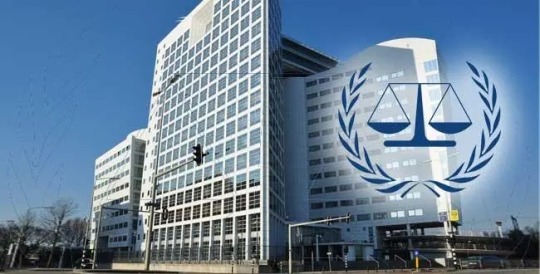
View On WordPress
#Double standards in international criminal justice#the legal and political background of the court’s decision against Sudanese President Omar al-Bashir#the relationship of the UN Security Council with the International Criminal Court#the text of the decision issued by the court against the Sudanese president.#نص القرار الذي أصدرته المحكمة ضد الرئيس السوداني.#الخلفية القانونية و السياسية لقرار المحكمة ضد الرئيس السوداني عمر البشير#ازدواجية المعايير في العدالة الجنائية الدولية#علاقة مجلس الأمن الدولي بالمحكمة الجنائية الدولية
0 notes
Text
الانتقائية في العدالة الجنائية الدولية
الانتقائية في العدالة الجنائية الدولية الانتقائية في العدالة الجنائية الدولية الكاتب : أحمد بشارة موسى الملخص: الحقيقة أن المعايير الإنسانية لا يتم اتخاذها إلا في مواجهة الدول الصغيرة والضعيفة، في حين نجد أن هناك العديد من الانتهاكات الجسيمة ضد الإنسانية ترتكب في أماكن أخرى من العالم، لم تحرك الأمم المتحدة فيها ساكنا ولم تطالب فيها بإنشاء محاكم جنائية دولية لمن ارتكبوا هذه الانتهاكات. كما أن…
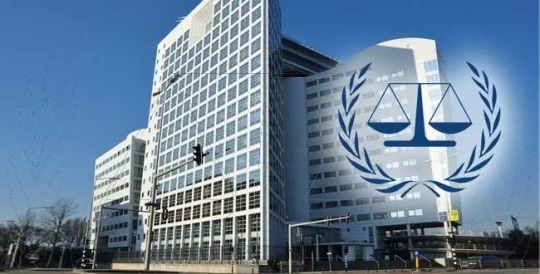
View On WordPress
#Double standards in international criminal justice#the legal and political background of the court’s decision against Sudanese President Omar al-Bashir#the relationship of the UN Security Council with the International Criminal Court#the text of the decision issued by the court against the Sudanese president.#نص القرار الذي أصدرته المحكمة ��د الرئيس السوداني.#الخلفية القانونية و السياسية لقرار المحكمة ضد الرئيس السوداني عمر البشير#ازدواجية المعايير في العدالة الجنائية الدولية#علاقة مجلس الأمن الدولي بالمحكمة الجنائية الدولية
0 notes
Text
Anyone who believes the ANC objects to genocide on general principles should consider this:
This is, incidentally, why I not only cannot accept that South Africa's ruling political party has discovered the concept that 'genocide is bad' is a thing it actually believes it, but that it specifically if anything has openly endorsed genocide of Black people as a point it considers an acceptable price of modern statesmanship. The Arab supremacist dictator Omar Al-Bashir, creator of the Janjaweed, was given the equivalent of a ticker tape parade and a medal for the ANC for creating an Arab supremacist-Islamist combination to slaughter the Dinka and Nuer of Darfur.
The ANC, the same people who fought so hard against white supremacy, have forgotten anything they used to stand for and the only moral principle guiding them now appears to be sheer spite.
#lightdancer comments on history#lightdancer comments on current events#darfur genocide#omar al bashir#jacob zuma#anc#aka south africa's regime founded by anti-apartheid guerrilla fighters believes oppression of Black people just fine if Arabs do it
0 notes
Text
this will be a bit of a long post but i ask that you please please read the full thing if you want to know more about Sudan- i feel like not enough people ACTUALLY know what's going on in Sudan. a lot of people have a vague idea that a 'war' and genocide is going on, but it's important to know the specifics as well.
there is extremely little coverage of Sudan from non-Sudanese sources, and even those that DO cover it often paint it as a war between two different generals for power over a country- and to a certain extent, without context, that IS what's happening. for those unaware, the two 'warring factions' in Sudan are the official Sudanese military- the SAF (Sudanese Armed Forces) and the RSF (Rapid Support Forces).
in April 2019, during the Sudanese Revolution, Islamist dictator Omar al-Bashir was deposed by the SAF in response to a mass wave of revolutionary organizing, protests, and sit-ins. Immediately after, the TMC (Transitionary Military Council) was established, with SAF general inspector Abdel Fattah al-Burhan being appointed as the chairman. for a brief time, protestors engaged in negotiations with Burhan, and many believed that he was being ernest in his promises of a true civilian democratic government- but it soon became clear to protestors that he was not actually taking their demands seriously, so demonstrations once again intensified. on June 3, 2019, it was under Burhan's command that the Khartoum Massacre was committed, killing 118 protestors while they were participating in a sit-in at the military headquarters in Khartoum.
as the next few months went by, agreements came about to dissolve the TMC and form a Transitional Sovereignty Council based on a draft of a constitutional declaration. it was supposed to be that a military official would be the chairman for 21 months, then transitioning to a civilian chairman for the next 18 months- but Burhan staged a coup in October of 2021, and dissolved the council and effectively turned the Sudanese government back into a military junta, which was the cause of further protesting.
i want to emphasize the crimes and horrors of the SAF because they are often forgotten in these discussions due to the absolute atrocities committed by the RSF. there is no good guy here- both the SAF and the RSF are vying for dictatorial power. so let's talk about the RSF.
headed by genocidal war criminal Mohamed Hamdan Dagalo, known more widely as "Hemedti", the RSF formed around 2014 due to reorginization of the Janjaweed militias- which were the militias that formed across the Darfuri regions of southwestern Sudan to suppress demonstrations against Bashir's oppressive and racist regime which carried out the first genocide of Massalit and other ethnically non-Arab peoples across Darfur in the early 2000s. so to be succinct- the RSF has direct roots in dictatorial suppression of Sudanis protesting against ethnic cleansing, genocide, and oppression.
for around a decade, the RSF and SAF were different factions of the Sudanese military- both have their roots and a pattern of supporting dictatorial violence and anti-Black genocide. and, on April 15, 2023, these two dictatorial Arab-colonialist powers began fighting out of the blue. fighting has been most intense around Khartoum, the central state and capital city of Sudan, where now an estimated 35% of its residents have been forced to flee, with the rest trapped in the middle of an active war zone.
the RSF has been actively continuing the genocide of non-Arab Darfuri Sudanis that its predecessor the Janjaweed committed 20 years prior. they have been consistently launching attacks against Massalit villages in Darfur and El Geneina. Recently, they have completely ethnically cleansed several Massalit villages, killing hundreds in each one of them. in addition, they are committing so many other war crimes, like sexual violence, blocking access to humanitarian aid, occupying civilian homes and kicking the residents out, along with blatant ethnic cleansing campaigns, mass murder, and targeting of civilians.
but don't think that this is a 'civil war' as many are calling it. a civil war is an internal dispute, but this is far from that. both the SAF and the RSF are supported by external powers, namely the UAE, Saudi Arabia, and Russia, who all provide funding to these groups IN EXCHANGE FOR SUDANESE RESOURCES LIKE GOLD AND OIL. this is, ultimately, not just some random war between two different military groups- it is a war funded by and for foreign colonial powers who have a vested interest in colonizing Sudan for its resources. as an example- the UAE's- and especially Dubai's- infamous gold and jewelry industry, is only made possible by the fact that the UAE illegally smuggles 80% of Sudan's gold- they fund this by sending weapons AND SOLDIERS to the RSF. Several of the gold mines in Sudan are owned and operated by the Russian government.
all of this, both the 'internal' AND the external, colonial aspects of this war and genocide, has led to the world's current WORST humanitarian crisis. not only do LOW estimates place the total murdered in the past year at 150,000, but out of Sudan's population of nearly 47 million, over half (25 million) are in severe need of humanitarian aid, and of those 25 million, over half are children. fighting between the RSF and SAF has lead to severe blockage of aid, and the UN's initial proposed budget of $1.5 billion in April of 2023 has not only not increased to accommodate the severe worsening of the crisis, but ALSO has not even been funded 20%.
2.5 MILLION PEOPLE ARE EXPECTED TO STARVE TO DEATH IN SUDAN BY THIS FUCKING SEPTEMBER. THAT IS LESS THAN 2 MONTHS AWAY.
additionally, due to both western colonization and the Sudanese governments' deliberate cutting of internet access across the entirety of Sudan, there is a huge lack of the proper infrastructure for generating awareness and spreading videos and info from on the ground in Sudan. this means that not only are people unable to effectively crowdfund support to leave, but they are also barred from accessing social media to spread awareness, and they're unable to contact loved ones outside of Sudan most of the time.
also, Sudan is HUGE- in order for displaced people to escape fighting, they usually have to walk, on foot, for hundreds of miles, often across literal deserts, with extremely little access to water. there has also been a surge of internally displaced people dying due to illness and scorpion stings in displacement camps. 70% of Sudan's hospitals have stopped functioning entirely. and even if they DO make it to a neighboring country, most of the options there are just as bad, if not worse- Egypt is extremely anti-Black, and doesn't allow work permits to most Black refugees, meaning they are relegated to being houseless and jobless if they go to Egypt- and westward in Chad, there is also crisis with food and resources, so the government of Chad quite literally can not materially support anymore Sudanese refugees. In South Sudan, there is also conflict, war, and crisis, and in Ethiopia, where the genocide is taking place in Tigray, the government is extremely hostile to Sudanese refugees. there are currently more than 6,000 Sudanese refugees stranded in the forests because of the hostilities they faced while in UNHCR camps.
and everyday that we're not doing something, this genocide, war, and humanitarian crisis is getting worse. doing something starts with being educated. i urge y'all to look more into this, don't just take what i'm saying and roll with it- truly learn and listen to Sudanese activists on this. i highly recommend following these accounts on Instagram:
@/red_maat , @/bsonblast , @/sudansolidaritycollective, @/forsudaneseliberation, @/darfurwomenaction, @/liberatesudan, @/zzeirra, @/yousraelbagir, @/modathirzainalabdeen, @/sdn.world, @/nasalsudan, @/sudanuntold, @/kandakamagazine, and @/almigdadhassan0
IF ANYTHING I'VE SAID IS INACCURATE, PLEASE LET ME KNOW!
i'd like to spread this post for some education. could you reblog this @decolonize-the-left @incorrectmadrigalfamilyquotes @homoidiotic @heritageposts @el-shab-hussein
@fairuzfan @palipunk @silicacid @sissa-arrows @apollos-olives @
@northgazaupdates @our-queer-experience @intersexfairy @genderqueerdykes
#🌌when the stars align ; reigns rambles🌌#sudan#free sudan#keep eyes on sudan#keep eyes on darfur#free darfur#genocide in sudan#stop the genocide
6K notes
·
View notes
Text
one of those masterposts for Sudan 🇸🇩
Disclaimer: I am not Sudanese, and am in no way an expert on the ongoing crisis. Corrections, if any, are welcome.
LAST UPDATED: 8th October 2024 [Please try to reblog the original post as much as possible]
~
So what's going on in Sudan? Sudan was under the rule of the military dictator Omar Al-Bashir for thirty years. He came to power through a military coup in June 1989. His rule saw extreme economic decline, repression, and conflict. In the December of 2018, a democratic revolution began that eventually overthrew the dictatorship on April 11, 2019, and saw the beginning of a military rule by militant parties SAF (Sudanese Armed Forces) and RSF (Rapid Support Forces). This unrest is, of course, funded by western governments.
On the 15th of April, 2023, fighting broke out in Khartoum between the SAF and RSF. Clashes spread across the nation of Sudan, and the civilian populace is still caught in the middle. According to UN officials, Sudan is in “one of the worst humanitarian nightmares in recent history."
There is an ongoing war in Sudan, and it's getting worse. There is a health crisis along with the humanitarian crisis as well: around 2/3rds of the population do not have access to healthcare services. Around 15-20 millions suffer from hunger. There are 70 non-operational healthcare facilities in conflict zones. Thousands killed, millions displaced, and a dramatic increase in sexual violence and rape cases.
~
Links for Learning Resources:
Hadhreen: Hadhreen started as an initiative by a small group of Sudanese youth in 2015. Since its inception it continued to work in a variety of sectors, most notably Emergency response, health, and in supporting vulnerable groups.
Talk About Sudan: Learn more about what's happening in Sudan and actions you can take. Also has donation links for those who are able.
Keep Eyes On Sudan: A website run by Sudanese diaspora to amplify the calls of the Sudanese people. Has donation links, actions you can take, upcoming protests and events, resources, FAQs, etc.
#SudanSyllabus.docx: An extensive and well-sourced document, providing English language resources about Sudanese history. It's really long and has got lots of links to books, articles, and more. Curated by Razan Idris.
Human Rights Watch
~
Donation Links:
List of verified charities providing humanitiarian assistance in Sudan
SudanFunds: Like GazaFunds, it is a compilation of GoFundMes for Sudanese individuals in war zones in need of help.
Help Sudan Tarada Initiative: The aim is to deliver emergency basic needs, food and medicine. Funds will be transferred directly to local charities and organization who are managing those shelters to make sure that the funds are well received and is spent on the needs specified.
One Million Sustainable Pads Campaign: Fundraiser to help provide women in IDPs camps with reusable pads
Zubeyda Adam and family (Sudan)
Our home bombarded and destroyed
Help my family escape Sudan's war
Save a transperson in african Refugee camp from starvation [Unsure about the legibility of this one since its not from the person themself, but if someone can verify this for me that would be great]
Hope For Sudan
Darfur Women Action
Doctors Without Borders
Fill A Heart: Financial Assistance to Sudanese Hospitals
Hometax: Sudan Relief
Cairo Sudan Aid
Amal For Women
Sudan Solidarity Collective
Sadagaat
UNICEF
~
These are all the links I have so far. Please spread awareness about Sudan! Let me know if there are any links I should add to the post and I will update it.
#lamp.txt#free sudan#eyes on sudan#sudan#keep eyes on sudan#sudan crisis#sudan genocide#hall of fame
3K notes
·
View notes
Text
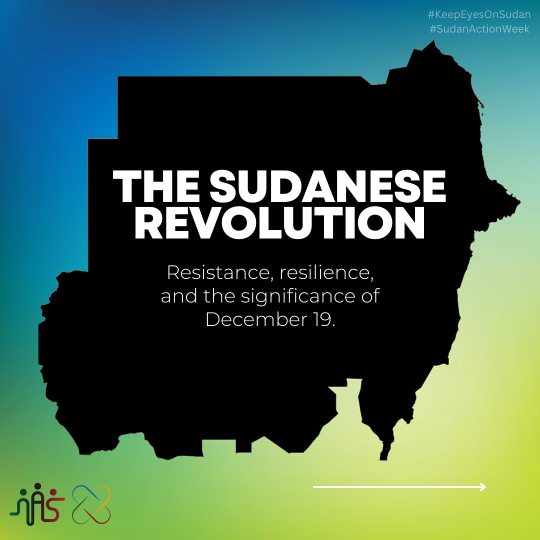
Via NasAlSudan
Learn about the Sudanese revolution, the significance of December 19, and a legacy of resistance and resilience.
Join our call to action today and everyday during Sudan Action Week.
December 19 2023
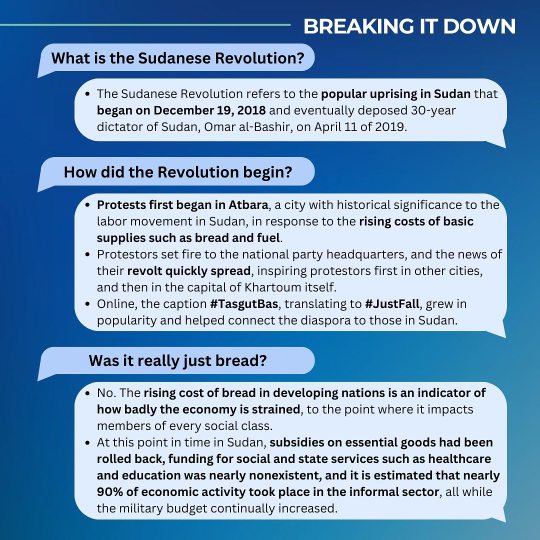
Transcript:
Breaking it down
What is the Sudanese Revolution?
The Sudanese Revolution refers to the popular uprising in Sudan that began on December 19, 2018 and eventually deposed 30-year dictator of Sudan, Omar al-Bashir, on April 11 of 2019.
How did the Revolution begin?
Protests first began in Atbara, a city with historical significance to the labor movement in Sudan, in response to the rising costs of basic supplies such as bread and fuel.
Protestors set fire to the national party headquarters, and the news of their revolt quickly spread, inspiring protestors first in other cities, and then in the capital of Khartoum itself.
Online, the caption #TasgutBas, translating to #JustFall, grew in popularity and helped connect the diaspora to those in Sudan.
Was it really just bread?
No. The rising cost of bread in developing nations is an indicator of how badly the economy is strained, to the point where it impacts members of every social class.
At this point in time in Sudan, subsidies on essential goods had been rolled back, funding for social and state services such as healthcare and education was nearly nonexistent, and it is estimated that nearly 90% of economic activity took place in the informal sector, all while the military budget continually increased.
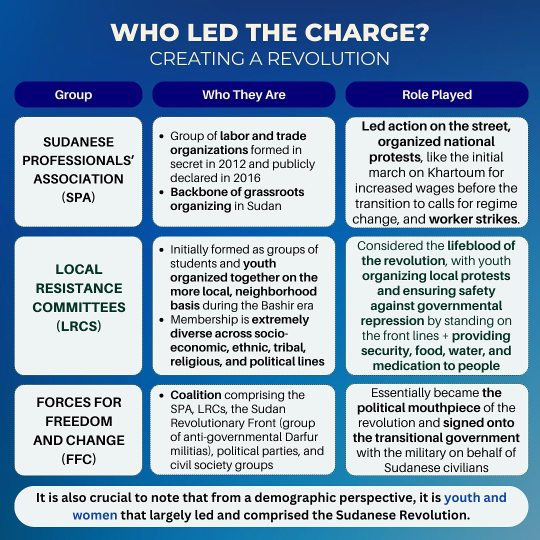
Transcript:
Who led the charge? Creating a revolution
Group: Sudanese Professional's association (SPA)
Who they are:
Group of labor and trade organizations formed in secret in 2012 and publicly declared in 2016
Backbone of grassroots organizing in Sudan
Role played:
Led action on the street, organized national protests, like the initial march on Khartoum for increased wages before the transition to calls for regime change, and worker strikes.
Group: Local Resistance Committees (LRCS)
Who they are:
Initially formed as groups of students and youth organized together on the more local, neighbourhood basis during the Bashir era
Membership is extremely diverse across socio-economic, ethnic, tribal, religious, and political lines
Role played:
Considered the lifeblood of the revolution, with youth organizing local protests and ensuring safety against governmental repression by standing on the front lines + providing security, food, water, and medication to people
Group: Forces for freedom and change (FFC)
Who they are:
Coalition comprising the SPA, LRCS, the Sudan Revolutionary Front (group of anti-governmental Darfur militias), political parties, and civil society groups
Role played:
Essentially became the political mouthpiece of the revolution and signed onto the transitional government with the military on behalf of Sudanese civilians
It is also crucial to note that from a demographic perspective, it is youth and women that largely led and comprised the Sudanese Revolution.
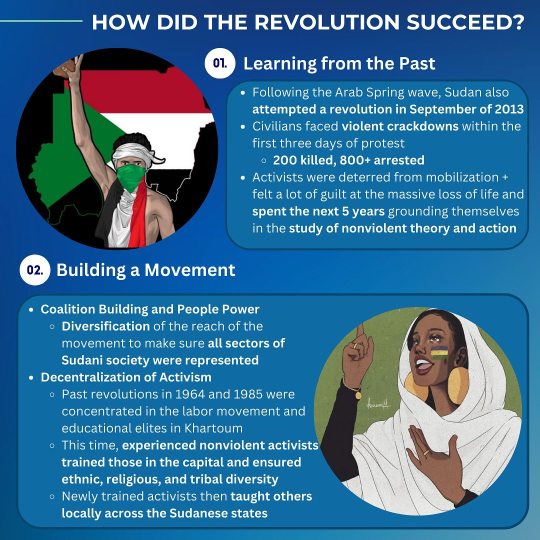
Trabscript:
How did the revolution succeed?
01. Learning from the Past
Following the Arab Spring wave, Sudan also attempted a revolution in September of 2013
Civilians faced violent crackdowns within the first three days of protest. 200 killed, 800+ arrested
Activists were deterred from mobilization + felt a lot of guilt at the massive loss of life and spent the next 5 years grounding themselves in the study of nonviolent theory and action
02. Building a Movement
Coalition Building and People Power
Diversification of the reach of the movement to make sure all sectors of Sudani society were represented
Decentralization of Activism
Past revolutions in 1964 and 1985 were concentrated in the labor movement and educational elites in Khartoum
This time, experienced nonviolent activists trained those in the capital and ensured ethnic, religious, and tribal diversity
Newly trained activists then taught others locally across the Sudanese states
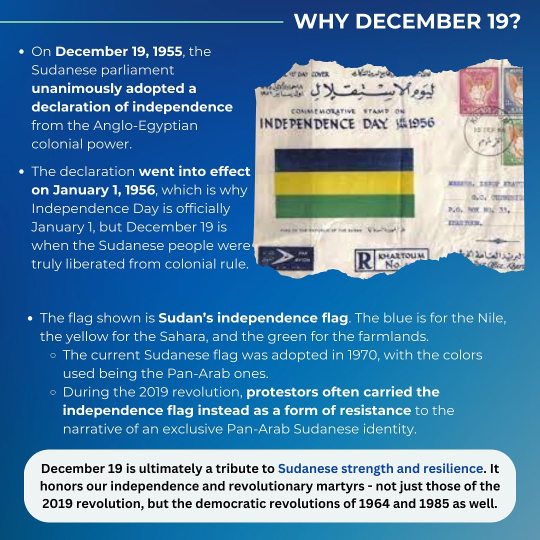
Transcript:
Why december 19?
On December 19, 1955, the Sudanese parliament unanimously adopted a declaration of independence from the Anglo-Egyptian colonial power.
The declaration went into effect on January 1, 1956, which is why Independence Day is officially January 1, but December 19 is when the Sudanese people were truly liberated from colonial rule.
The flag shown is Sudan's independence flag. The blue is for the Nile, the yellow for the Sahara, and the green for the farmlands.
The current Sudanese flag was adopted in 1970, with the colors used being the Pan-Arab ones.
During the 2019 revolution, protestors often carried the independence flag instead as a form of resistance to the narrative of an exclusive Pan-Arab Sudanese identity.
December 19 is ultimately a tribute to Sudanese strength and resilience. It honors our independence and revolutionary martyrs - not just those of the 2019 revolution, but the democratic revolutions of 1964 and 1985 as well.
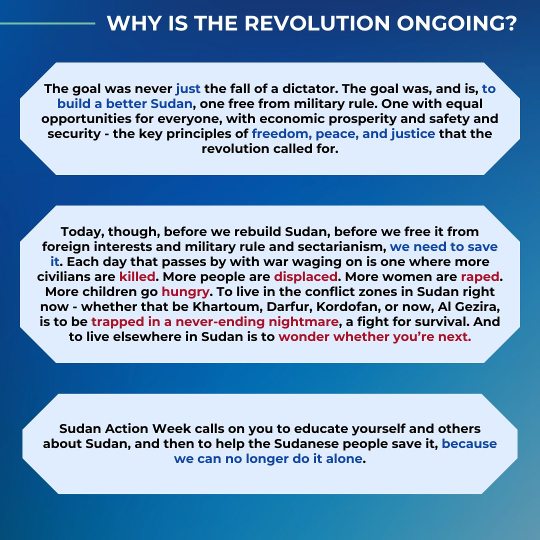
Transcript:
Why is the revolution ongoing?
The goal was never just the fall of a dictator. The goal was, and is, to build a better Sudan, one free from military rule. One with equal opportunities for everyone, with economic prosperity and safety and security - the key principles of freedom, peace, and justice that the revolution called for.
Today, though, before we rebuild Sudan, before we free it from foreign interests and military rule and sectarianism, we need to save it. Each day that passes by with war waging on is one where more civilians are killed. More people are displaced. More women are raped. More children go hungry. To live in the conflict zones in Sudan right now - whether that be Khartoum, Darfur, Kordofan, or now, Al Gezira, is to be trapped in a never-ending nightmare, a fight for survival. And to live elsewhere in Sudan is to wonder whether you're next.
Sudan Action Week calls on you to educate yourself and others about Sudan, and then to help the Sudanese people save it, because we can no longer do it alone.
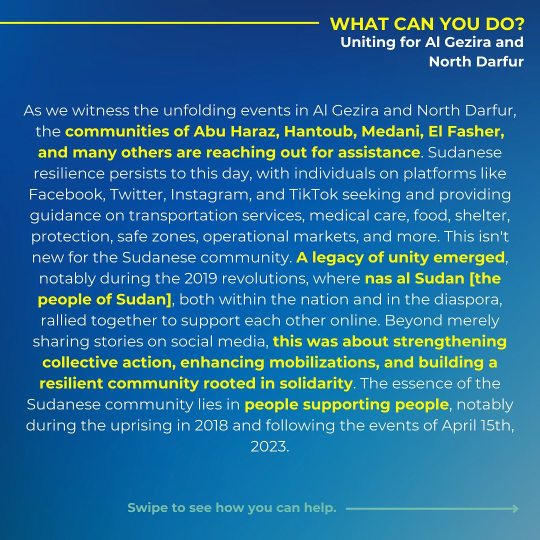
Transcript:
What can you do? Uniting for Al Gezira and North Darfur
As we witness the unfolding events in Al Gezira and North Darfur, the communities of Abu Haraz, Hantoub, Medani, El Fasher, and many others are reaching out for assistance. Sudanese resilience persists to this day, with individuals on platforms like Facebook, Twitter, Instagram, and TikTok seeking and providing guidance on transportation services, medical care, food, shelter, protection, safe zones, operational markets, and more. This isn't new for the Sudanese community. A legacy of unity emerged, notably during the 2019 revolutions, where nas al Sudan [the people of Sudan], both within the nation and in the diaspora, rallied together to support each other online. Beyond merely sharing stories on social media, this was about strengthening collective action, enhancing mobilizations, and building a resilient community rooted in solidarity. The essence of the Sudanese community lies in people supporting people, notably during the uprising in 2018 and following the events of April 15th, 2023
Swipe to see how you can help.
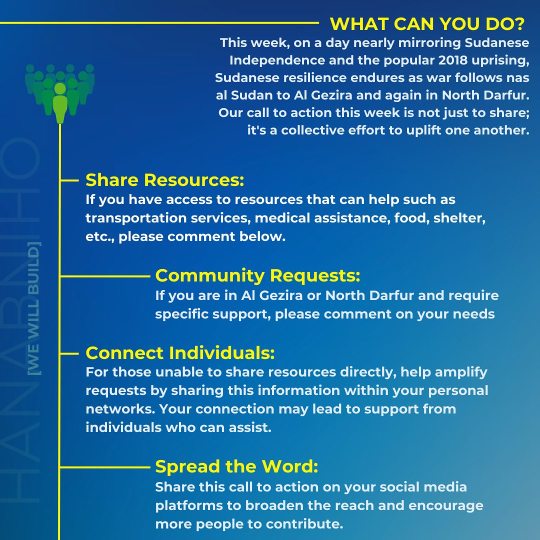
Transcript:
What can you do?
This week, on a day nearly mirroring Sudanese Independence and the popular 2018 uprising, Sudanese resilience endures as war follows nas al Sudan to Al Gezira and again in North Darfur. Our call to action this week is not just to share; it's a collective effort to uplift one another.
Share Resources:
If you have access to resources that can help such as transportation services, medical assistance, food, shelter, etc., please comment below.
Community Requests:
If you are in Al Gezira or North Darfur and require specific support, please comment on your needs
Connect Individuals:
For those unable to share resources directly, help amplify requests by sharing this information within your personal networks. Your connection may lead to support from individuals who can assist.
Spread the Word:
Share this call to action on your social media platforms to broaden the reach and encourage more people to contribute.
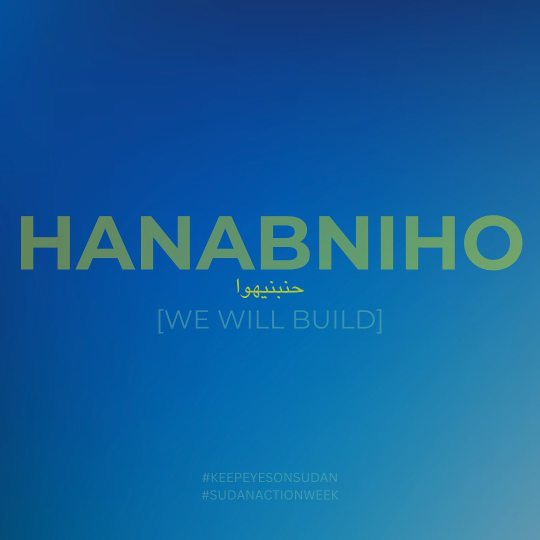
Transcript:
Hanabniho
حنبنيهوا
[We will rebuild]
#keepEyesOnSudan
#SudanActionWeek
925 notes
·
View notes
Text
Let's talk about Sudan-
TRANSCRIPT UNDER CUT

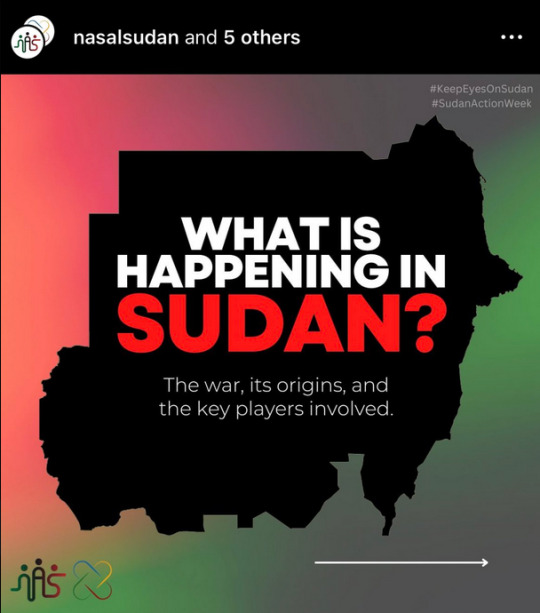
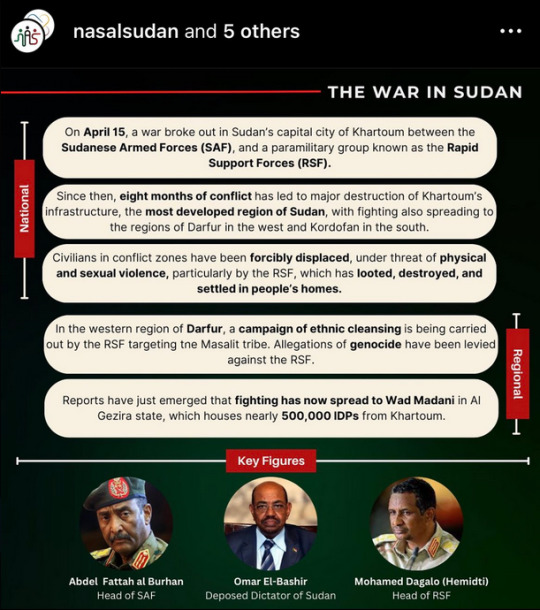
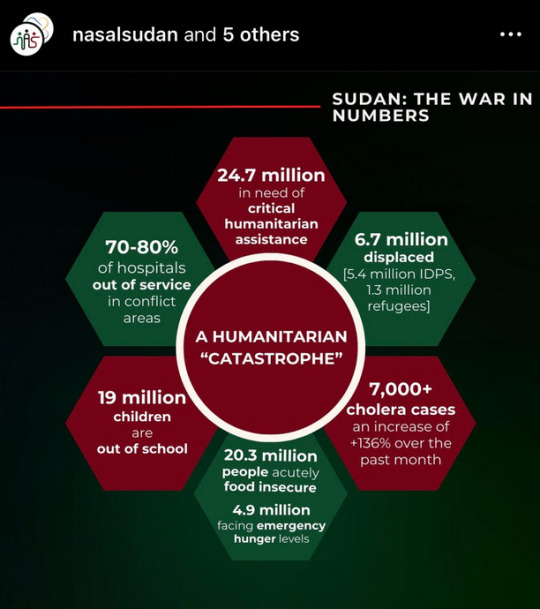

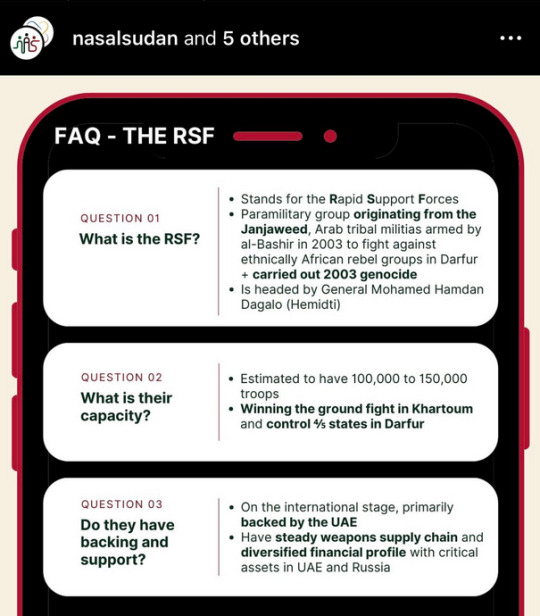
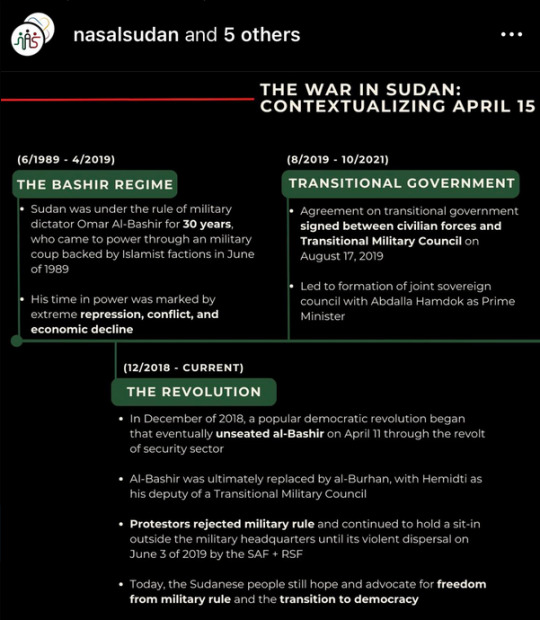
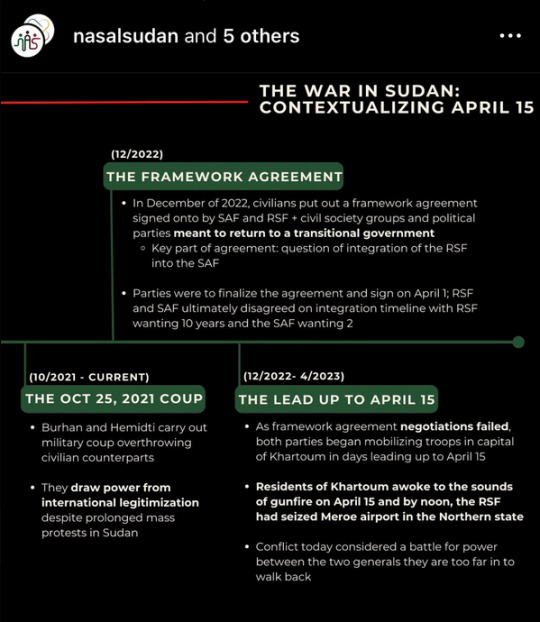
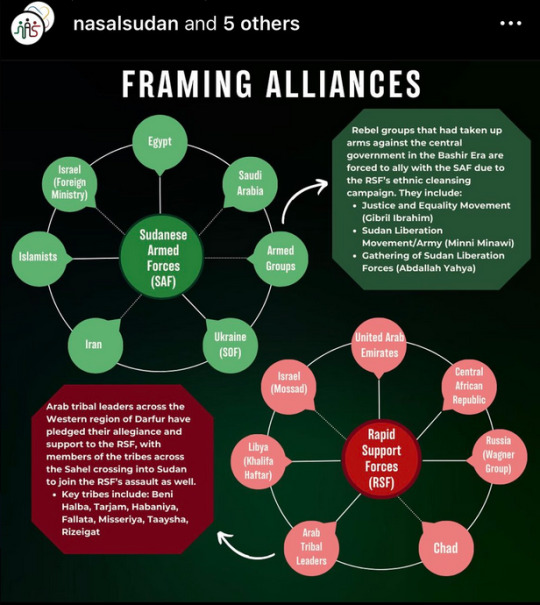
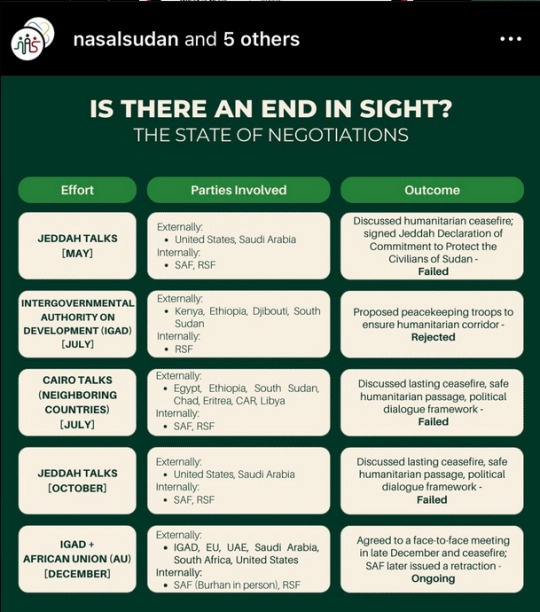
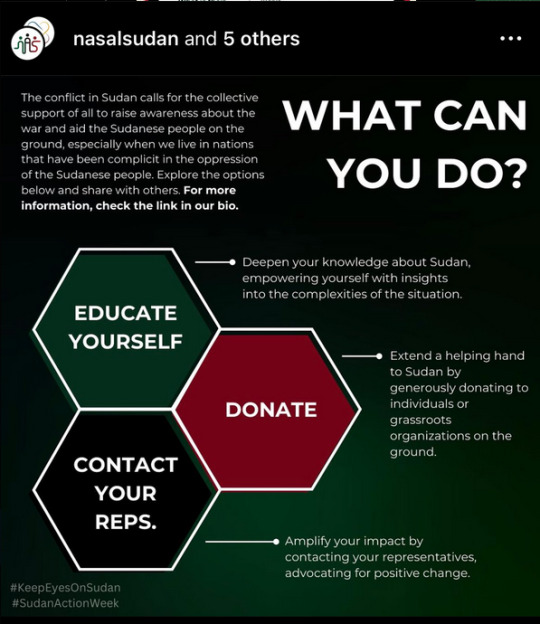
Transcript: What is happening in Sudan? The war, its origins, and the key players involved.
The war in Sudan
On April 15, a war broke out in Sudan's capital city of Khartoum between the Sudanese Armed Forces (SAF), and a paramilitary group known as the Rapid Support Forces (RSF). Since then, eight months of conflict has led to major destruction of Khartoum's infrastructure, the most developed region of Sudan, with fighting also spreading to the regions of Darfur in the west and Kordofan in the south.
Civilians in conflict zones have been forcibly displaced, under threat of physical and sexual violence, particulary by the RSF, which has looted, destroyed, and settled in people's homes.
In the western region of Darfur, a campaign of ethnic cleansing is being carried out by the RSF targeting the Masalit tribe. Allegations of genocide have been levied against the RSF.
Reports have just emerged that fighting has now spread to Wad Madani in AI Gazira state, which houses nearly 500,00 IDPs from Khartoum.
Key Figures: Abdel Fattah al Burhan (head of SAF), Omar El-Bashir (deposed dictator of Sudan), Mohamed Dagalo (Hemidti) (head of RSF)
Sudan: the war in numbers
24.7 million in need of critical humanitarian assistance 6.7 million displaced [5.4 million IDPS, 1.3 million refugees] 7,000+ cholera cases an increase of +136% over the past month 20.3 million people acutely food insecure- 4.9 million facing emergency hunger levels 19 million children are out of school 70-80% of hospitals out of service in conflict areas
FAQ - THE SAF
What is the SAF?
stands fro the Sudanese Armed Forces
is the de-facto government of Sudan
is headed by Lt. General Abdel Fattah al-Burhan
What is their capacity?
estimated to have aprox. 200,000 personnel and tactical advantage of airforce
currently control of relative northern and eastern regions of Sudan with functioning capital in Port Sudan (East)
Do they have backing and support?
on the international stage, primarily backed by Egypt
limited weapons supply from allies
internally, the SAF is ultimately considered the lesser of two evils
FAQ - THE RSF
What is the RSF?
stands fro Rapid Support Forces
paramilitary group originating from the Janjaweed, Arab tribal militias armed by al-Bashir in 2003 to fight against ethnically African rebel groups in Darfur + carried out 2003 genocide
is headed by General Mohamed Hamdan Dagalo (Hemidti)
What is their capacity?
estimated to have 100,000 to 150,000 troops
winning the ground fight in Khartoum and control 4/5 states in Darfur
Do they have backing and support?
on the international stage, primarily backed by the UAE
have steady weapons supply chain and diversified financial profile with critical assets in UAE and Russia
The war in Sudan: contextualizing April 15
6/1989 - 4/2019 - The Bashir Regime Sudan was under the rule of military dictator Omar Al-Bashir for 30 years, who came to power through an military coup backed by Islamist factions in June of 1989 His time in power was marked by extreme repression, conflict, and economic decline
12/2018 - current - The revolution In December of 2018, a popular democratic revolution began taht eventually unseated al-Bashir on April 11 through the revolt of security sector Al-Bashir was ultimately replaced by al-Burhan, with Hemidti as his deputy of a Transitional Military Council Protestors rejected military rule and continued to hold a sit-in outside the military headquarters until its violent dispersal on June 3 of 2019 by the SAF + RSF Today, the Sudanese people still hope and advocate for freedom from the military rule and the transition to democracy
8/2019 - 10/2021 - Transitional Government Agreement on transitional government signed between civilian forces and Transitional Military Council on August 17, 2019 Led to formation to joint sovereign council with Abdalla Hamdok as Prime Minister
10/2021 - Current - The Oct 25, 2021 Coup Burhan and Hemidti carry out military coup overthrowing civilian counterparts They draw power from international legitimization despite prolonged mass protests in Sudan
12/2022- The Framework Agreement In December of 2022, civilians put out a framework agreement signed onto by SAF and RSF + civil society groups and political parties meant to return to a transitional government - key part of agreement: question of integration of the RSF into the SAF Parties were to finalize the agreement and sign on April 1; RSF and SAF ultimately disagreed on the integration timeline with RSF wanting 10 years and the SAF wanting 2
12/2022-4/2023 - The Lead up to April 15 As framework agreement negotiations failed, both parties began mobilizing troops in capital of Khartoum in days leading up to April 15 Residents of Khartoum awoke to the sounds of gunfire on April 15 and by noon, the RSF had seized Meroe airport in the Northern state Conflict today considered a battle of power between the two generals they are too far in to walk back
Framing alliances
Sudnese Armed Forces (SAF):
Saudi Arabia
armed groups- rebel groups that had taken up arms against the central government in the Bashir Era are forced to ally with the SAF due to the RSF's ethnic cleansing campaign. They include: Justice and Equality Movement (Gibril Ibrahim), Sudan Liberation Movement/Army (Minni Minawi), Gathering of Sudan Liberation Forces (Abdallah Yahya)
Ukraine (SOF)
Iran
Islamists
Israel (Foreign Ministry)
Egypt
Rapid Support Forces (RSF):
United Arab Emirates
Central African Republic
Russia (Wagner Group)
Chad
Arab Tribal Leaders- Arab tribal leaders across the Western region of Darfur have pledged their allegiance and support to the RSF, with members of the tribes across the Sahel crossing into Sudan to join the RSF's assault as well. Key tribes include: Beni Halba, Tarjam, Habaniya, Fallata, Misseriya, Taaysha, Rizeigat
Libya (Khalifa Haftar)
Israel (Mossad)
Is there an end in sight? The state of negotiations
Effort- Jeddah Talks [May] Parties Involved- Externally: United States, Saudi Arabia. Internally: SAF, RSF Outcome: discussed humanitarian ceasefire; signed Jeddah Declaration of Commitment to Protect the Civilians of Sudan- FAILED
Effort- Intergovernmental authority on development (IGAD) [July] Parties Involved- Externally: Kenya, Ethiopia, Djibouti, South Sudan . Internally: RSF Outcome: proposed peacekeeping troops to ensure humanitarian corridor-REJECTED
Effort- Cairo talks (neighboring countries) [July] Parties Involved- Externally: Egypt, Ethiopia, South Sudan, Chad, Eritrea, CAR, Libya. Internally: SAF, RSF Outcome: discussed lasting ceasefire, safe humanitarian passage, political dialogue framework-FAILED
Effort- Jeddah talks [October] Parties Involved- Externally: United States, Saudi Arabia . Internally: SAF, RSF Outcome: discussed lasting ceasefire, safe humanitarian passage, political dialogue framework-FAILED
Effort- IGAD + African Union (AU) [December] Parties Involved- Externally: IGAD, EU, UAE, Saudi Arabia, South Africa, United States. Internally: SAF (Burhan in person), RSF Outcome: agreed to face-to-face meeting in late December and ceasefire; SAF later issued a retraction-ONGOING
What can you do?
The conflict in Sudan calls for the collective support of all to raise awareness about war and aid the Sudanese people on the ground, especially when we live in nations that have been complicit in the oppression of the Sudanese people. Explore the potions below and share with others. Educate yourself- deepen your knowledge about Sudan, empowering yourself with insights into the complexities of the situation. Donate- extend a helping hand to Sudan by generously donation to individuals or grassroots organizations on the ground.
Contact your reps- amplify your impact by contacting your representatives, avocating for positive change
226 notes
·
View notes
Text
Sudan conflict: what's behind the war
March 21 (Reuters) - A conflict in Sudan that erupted in April 2023 unleashed waves of ethnic violence, created the world's worst humanitarian crisis and plunged several areas into famine.
https://www.reuters.com/world/africa/whats-behind-sudans-crisis-2023-04-17/
WHAT TRIGGERED THE VIOLENCE?
Tensions were building for months before fighting between Sudan's army and the RSF erupted in Khartoum on April 15, 2023.
The army and RSF had been in a fragile partnership after staging a coup in October 2021, which derailed a transition from the rule of Islamist autocrat Omar al-Bashir. Bashir was ousted in 2019.
The two sides clashed over an internationally backed plan that would have launched a new transition with civilian parties and required the army and the RSF to cede powers.
Specific points of dispute were the timetable for the RSF to be integrated into the regular armed forces, the chain of command between the army and RSF leaders, and the question of civilian oversight.
16 notes
·
View notes
Text
WHATS HAPPENING IN SUDAN AND HOW TO HELP!
Hello! In this post I will try my best to bring awareness to the situation in Sudan, I am calling you to please watch the videos I link, donate to the funds I link, and follow the accounts I link. And please say educated. We need all eyes on Sudan, we need more people talking about Sudan NOW. They need your voice and support, and you can do so much more than you think. If you find any misinformation or mistakes in my post, please contact me regarding the issue, thank you.
Whats happening?
"We left our children and families to come to this hospital. We can't find food or anything else. The children are sick and in need of treatment but there's no medicine no housing and no food. People are suffering alot." -Displaced mother in Sudan. source here, (source is a video by BBC News Africa, posted on October 4th 2024)
The SAF (Sudanese armed forces) have held power for almost a century, the country has a long history of coups, the first successful coup being in 1958 then in 1969, 1985, and in 1989 when Omar Al Bashir overthrew Sadiq Al Mahdi. Al Bashir was very close with the SAF, and after war broke out in Darfur, he became associated with Mohammed Hamdan Dagala "Hemedti" who then became leader of the RSF (Rapid support forces).
On April 11th 2019, Abdel Faltah Al Burhan (leader of the SAF) and Hemedti overthrew Al Bashir after much protest from the people of Sudan, these men could not be trusted however, soon turning in eachother and sparking a devastating war.
April 15 2023 - Bombs/gunfire reek havoc in Khartaum (capital city). In October 2021, a transitional government was put in place, soon overturned. The power struggle between the SAF and RSF lead to the war in April 2023.
August 2024 - Reported that thousands are killed, 10 million + were driven from their homes, and United Nations calls it "the world's most hunger crisis" + famine declared.
There are currently millions displaced, and 30 million at risk of hunger, including millions of children, who have no access to education or a health living environment. Most of Sudan is cut off from the world, so we must amplify the Sudanese voices we can.
May women and girls are also being raped, with many women being afraid to leave the home because of such. This is of course a very condensed explanation, so please watch this video for more info.
How to help?
Well you can donate to/support fundraisers, accounts and websites.
Please visit this website where you can find information/donation links.
Please visit
Along with
Please follow on tiktok:
@ bean_on_a_bike
@ zeirra7
@ atute_insp
@ bsonblast
Please follow @ sudanrevprotests on Instagram
Please see these educational tiktok videos:
Here
Here
Here
Here
Here
And here
The violence in Sudan is shocking, and nobody is talking about it. There are million I'm danger and hundreds being massacred. There are barely any outlets that cover this topic, and so Sudan needs OUR VOICES. The least you can do is spread awareness for them. And again, if I included any misinformation, or bad videos/websites please let me know.
Here is a petition for Sudan:
Thank you so much for your time and efforts.
Free Sudan.
#fypシ#fypage#fyp#tumblr fyp#foryopage#sudan genocide#sudan#support#fund management#art fundraiser#fundraiser#fund raising#awareness post#algorithm#please boost#signal boost#donation#donate#please donate#donations#please help#help please#send help#need help#plants#playlist#please#genocide#important#crowdfunding
18 notes
·
View notes
Text
Turkey’s recent effort to join South Africa’s genocide case at the International Court of Justice (ICJ) over Israel’s conduct in the Gaza Strip highlights a double standard that is all too common when it comes to the politics of genocide.
The Turkish state has little credibility being an arbiter of what constitutes genocide when it has spent the last 100 years denying the role of the Ottoman Empire in the 1915-16 Armenian genocide, during which more than 1 million Armenians were killed or died of starvation or disease, according to genocide scholars, as they were pushed by the Ottoman Turks out of Anatolia. Turkey refuses to acknowledge or apologize for these events to this day, despite recognition of the genocide by countries such as the United States, France, and Germany.
Ankara’s participation undermines the intent and moral seriousness of South Africa’s charges and highlights the unfettered hypocrisy that characterizes genocide allegations made by many governments. Turkey formally denies that the events of 1915-16 constitute genocide; its participation in many ways weakens the current ICJ case by giving Israel an opening to question the legitimacy of the charges.
For far too long, various governments, from the United States to Turkey to Israel, have leveled (or downplayed) genocide allegations in pursuit of various political objectives. But genocide is not a political football to be tossed around. It is a serious allegation that should never be used for political expediency. But sadly, that is what it has become.
Since the founding of NATO, Turkey has exploited its membership in the alliance to both curry favor with the West and avoid any culpability for its actions. It has used its crucial role within NATO as a bargaining chip to its advantage.
It is one of the reasons why U.S. presidents from both political parties have turned a blind eye to Turkey’s denial of the Armenian genocide by arguing that the country’s proximity to the Soviet Union was strategically valuable to the national interests of the United States. When the Cold War ended, the argument turned to Turkey’s importance as a “free” and “democratic” society in a sea of Islamic fundamentalists.
And over the last 20 years, U.S. presidents have largely overlooked Turkish President Recep Tayyip Erdogan’s rising authoritarianism and egregious regional behavior on the grounds that having Ankara as an ally is strategically important for Washington. This type of transactional diplomacy not only is dangerous but also gives cover to leaders like Erdogan, who feel that they can say or do whatever they want with impunity.
It is unconscionable that Israel, a country founded in the wake of genocide, would deny the Armenian genocide. But that is largely what Israel has done for years—and it is politically motivated. Despite maintaining extensive ties with Turkey, until recently when trade between the countries was suspended, Israel has used the Armenian genocide to needle Ankara when they clash, as they are now over the conflict in Gaza.
Opportunistically referencing a genocide to shame a rival—as Israeli officials did for the first time regarding the Armenian genocide after Turkey decided to support the ICJ case—has no place in international relations. Governments either support a policy of denial or oppose it. There should be no equivocation.
Cherry-picking what represents genocide also sends the wrong message to would-be aggressors who see such vacillation as a green light to act with impunity and evade legal accountability.
It is how former Sudanese President Omar al-Bashir was able to direct the killings of hundreds of thousands of people in the Darfur region in the early 2000s and escape justice—despite being indicted and wanted by the International Criminal Court (ICC) for committing crimes against humanity, war crimes, and genocide. Because various governments did not recognize his acts as genocidal or failed to abide by the ICC indictment, Bashir was for years able to travel freely around the world to visit countries including China, Egypt, and Saudi Arabia as well as Rome Statute signatories such as Jordan, Kenya, Nigeria and, most notably, South Africa—all of which failed to arrest him.
It is how China continues to persecute Uyghurs and other minorities in Xinjiang with few repercussions, even from many Muslim-majority nations, such as Indonesia, Pakistan, and the United Arab Emirates—all of which have rejected a U.N. motion to hold a debate about China’s human rights abuses for political and economic reasons.
And it is how Azerbaijan, one of Turkey’s staunchest allies, has brazenly followed Ankara’s lead in denying the Armenian genocide while seeking to ethnically cleanse Armenians today following its 2023 military offensive in the Nagorno-Karabakh region. Taking a page out of the Turkish playbook, Azerbaijan has been able to leverage political expediency to its benefit by using its vast natural resource wealth, namely oil and gas, to essentially buy a seat at the world’s table as it did when it was named the host country for this year’s U.N. Climate Change Conference.
It is also one of the reasons why Azerbaijan has been able to avoid any punishment from the international community for its mistreatment of ethnic Armenians in Karabakh. While Turkey has deftly used the cover of geopolitics to hide from its genocidal past, Azerbaijan is using global energy demand to obfuscate its own crimes today.
This lack of accountability gives authoritarian leaders and bad actors the wherewithal to ignore international organizations and human rights groups seeking to hold criminals accountable and prevent these types of crimes from happening in the future.
Playing politics with genocide sets a dangerous precedent. It denies victims justice and distracts from the actual merits of the crime. If the international community wants to take genocide seriously, then it must be consistent in its application of the law and its meaning.
81 notes
·
View notes
Text
Twenty years ago, American celebrities like George Clooney and Ryan Gosling urged us all to “Save Darfur” from the brutal conflict and ethnic cleansing campaign occurring under Sudanese leader Omar al-Bashir. Bashir is now gone, but the militias he empowered have been carrying out brutal ethnic cleansings yet again in at least some parts of Darfur, according to a report released Wednesday from Human Rights Watch. The report details horrific, ethnically targeted crimes like the killing of men and boys from ethnic Massalit and other non-Arab tribes in West Darfur, as well as rape, other forms of sexual violence, torture, other war crimes, and crimes against humanity. The Massalit and other ethnic groups in the Darfur region endured similar agonies in the early 2000s, when a group of militias known as the Janjaweed — which have now evolved into a powerful paramilitary force called the Rapid Support Forces (RSF) — crushed uprisings in the region. Today, the RSF and the Sudanese Armed Forces (SAF) are locked in a ferocious, deadly power struggle that began last April, quashing the country’s long struggle to transition to democracy. Since the war broke out, 8.7 million people have been displaced, the risk of famine is imminent, and thousands have been killed, with no end in sight as much of the globe turns toward Israel’s war in Gaza.
59 notes
·
View notes
Text
As South Africa spews its Orwellian blood libel against Israel at the #ICJ, you should seek answers to several ?'s.
Here’s one: what did South Africa do when the butcher of Darfur, Omar al-Bashir, landed in their country with an outstanding arrest warrant for genocide?
Nothing.
That’s right. Nothing.
Two South African courts recognized the country's obligation to arrest & surrender al-Bashir to stand trial for his monstrous campaign of genocide against three ethnic groups: the Fur, Masalit, & Zaghawa people.
But al-Bashir - who was responsible for directing the murder of more than 300,000 innocents, along with countless thousands of rapes, mutilations, torture, & deportation - was permitted to land safely on #SouthAfrican soil, remain in that country during three days in June 2015, and then leave without any complication or barrier whatsoever.
Two years later, in July 2017, #SouthAfrica was admonished by the #ICC for failing to comply with its obligation to prevent & punish #genocide by permitting al-Bashir to visit & then freely leave despite al-Bashir being a man whose name should be known among the worst human rights violators & mass murderers in history.
That same South Africa, less than a decade later, has the audacity to bring a complaint of “genocide” against the world’s only #Jewish State.
Plainly, South Africa’s complaint is not worth the paper on which it is written.
People are suffering in #Gaza as a result of #Hamas - the only genocidal actor in this war.
And yet …
- South Africa’s compliant completely ignores that it is Hamas that clearly states its intent to commit genocide against Israel & #Jews the world over in its charter & in statements repeated over decades;
- South Africa’s complaint completely ignores that it is Hamas that has repeatedly taken actions in various murder campaigns, suicide bombings, & other terrorist actions over the last 30+ years in an effort to carry out its explicit genocidal intentions against Jews & Israel;
- South Africa’s complaint completely ignores that there was a ceasefire on 10/7 before Hamas committed a #genocidal #massacre when 3,000+ #HamasTerrorists raided Israel with the express purpose of murdering, raping, mutilating, torturing, & kidnapping as many Jews as possible; and
- South Africa’s complaint completely ignores the statement of Hamas spokesman Ghazi Hamad from shortly after 10/7 when he he stated Hamas’ intent to “remove [Israel]” by committing similar massacres “again and again.”
In short, South Africa ignores the one and only genocidal actor in this war - Hamas.
South Africa ignores or is willfully blind to the fact that Hamas’ “dispute” with Israel has nothing to do with land or borders.
Hamas explicitly seeks the total destruction of the Jewish state and the Jewish people.
So the real “dispute” is actually quite simple: Hamas wants Israelis & Jews to be dead, and the Israelis & Jews want to live.
But South Africa ignores reality when it comes to Hamas, and instead vilifies Jews and the one and only Jewish State.
In its complaint, South Africa distorts & misrepresents facts while flat-out lying about others.
Through its complaint, South Africa is attempting to give international legitimacy to #antisemitic Hamas #propaganda that attempts to justify Hamas’ genocidal brutality as “#resistance,” while labeling Israel’s actions in #SelfDefense as “genocide.”
Get yourself educated on the facts.
Do not be another mindless puppet of the propaganda machine that ignores true human rights violators across the world while seeking to demonize & delegitimize only one people, the Jews, and only one state, Israel.
Captain Allen
@CptAllenHistory
92 notes
·
View notes